Jonathan Lethem Returns to the Scene of the Crime
In his new novel, the bard of Boerum Hill interrogates the brutal truths of gentrification.
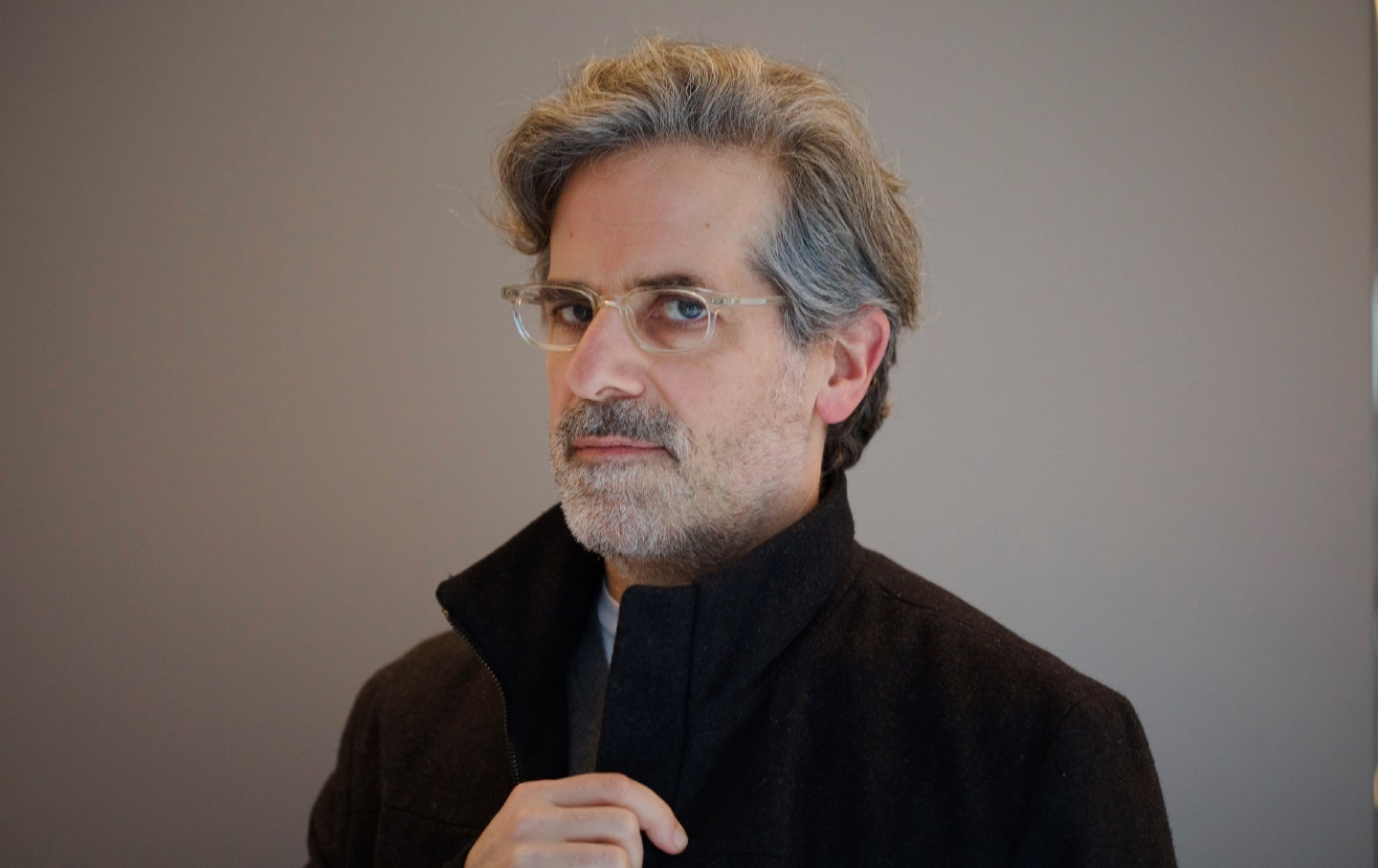
Jonathan Lethem, as he sees it, is the last of his kind—the Brooklyn novelist who wanted to flee Brooklyn. “The idea, when I was growing up—and it was an old one—was you got out of that place. And if you could put it behind you, you might not even mention it. You certainly wouldn’t fixate on it,” Lethem told me in his Times Square hotel, where he was staying for the New York leg of his book tour. We had agreed to meet to discuss Brooklyn Crime Novel in the quiet nook of an upstairs bar.
“Henry Miller, he goes there for a chapter, Black Spring, otherwise he’s, like, in the bigger world. Or Norman Mailer, who kind of sets one novel in a brownstone but he’s not really into being from Brooklyn, wearing it on its sleeve, writing about that experience. And many other people, like Robert Stone, you’d never even know he’s from Brooklyn.”
Brooklyn, of course, had to be on Lethem’s mind. Though his latest novel excavates the Boerum Hill terrain his readers know well, this time around, he writes, there will be “no music, no honeyed light,” no “ooze of nostalgia.” The crimes are both petty—muggings, bloody sidewalk beatings—and world-historical, like the genocidal theft of tribal land. A multiracial cast, unnamed and nicknamed (C., the Wheeze, the Slipper), populates a world shorn of narrative, hopscotching from the 1970s to 2019, interspersed with riffs on the borough’s racial and economic strife. “I hadn’t chosen Brooklyn, it chose me, and I was still trying to figure out if that was a great thing or not,” Lethem said. “I did feel that I didn’t identify with what was happening in the way people might expect me to.”
For the Brooklynites of Lethem’s generation, the recent star turn of the borough will always, to a notable degree, flummox. In the bowels of the 1970s, the future could only be a rumor, and at the time it seemed inevitable that it would have to, in some form, resemble the present: unruly, cacophonic, and unmistakably working class. To have means or ambition was to hurry elsewhere, to be a Tony Manero dipping into the R train tunnel with grand longings for imperial Manhattan—“The City,” forever glittering in the wounded imagination.
Brooklyn’s decades-long renaissance, which kicked off at the dawn of my childhood—a quarter century after Lethem’s—has steadily transformed a majority of its neighborhoods into luxury products and wondrous investment opportunities. Lethem decamped from Brooklyn to Bennington College and then California, and his early novels, delightful genre-bending works that owed much to Phillip K. Dick, had nothing to do with the borough. Then came Motherless Brooklyn and The Fortress of Solitude, and the identification of Lethem as The Brooklyn Writer—in league with the other Jonathans, who wrote and thought differently but were conveniently dwelling there—was cemented, no matter that he would continue to range (and live) elsewhere, from the phantasmagoria of a parallel universe Manhattan to pastoral, postapocalyptic Maine. (His best novel, post-Fortress, might have been the one set in Sunnyside, Queens.)
Now, he’s returned. Like his fellow Bennington classmate, Bret Easton Ellis, Lethem has come back to the scene of the crime. What crime? Ellis, in The Shards, reimagines his lush LA high school as the staging ground for a possible serial killer. Both Brooklyn Crime Novel and The Shards swerve into autofictional terrain without taking on the tired tropes of the genre; both men, born in 1964, contort and ultimately reinvigorate the form. The very name Boerum Hill is, as Lethem has noted in both his fiction and nonfiction, an invention of the affluent white homeowners and real estate operators who saw, in this rectangular swath of crumbling 19-century rowhouses and brownstones wedged between public housing and a contaminated canal, an opportunity for a dramatic rebrand—name it all for a slaveholding member of the Continental Congress, and pretend that among the topographically flat terrain there is a hill hiding somewhere.
Brooklyn Crime Novel’s subtle brilliance lies in Lethem’s decision, in the tradition of an Italo Calvino or Gilbert Sorrentino, to blast away the ligatures that would bind a conventional, linear novel. Plot, narrative, and the gauzy, heroic arc of character are discarded. Scenes pile up, from barrooms to bodegas, the neighborhood itself roaring to centerstage. With an untamed, metafictional narrator, Lethem is able to interrogate the brutal truths of gentrification—and what it means to have found success as a writer emerging at such a pivot point in history. He plunges us into a world of pilfered baseball mitts, musty bookstores, and casual beatdowns, the racial politics plain as black and white. Lethem advertises his own internal conflicts, offering up a “whiteboy” novelist who grew up in the neighborhood and later published a cultural touchstone called Take Me to the Bridge, a pastiche of his most famous works.
Lethem told me he had no intention, after the 2000s, of revisiting the Dean Street of his youth. It was only after he was able take in The Fortress of Solitude off-Broadway musical that he reconsidered. He began to imagine people who, in fact, “fucking hate” his celebrated novel and he decided “to method act that from the inside.”
“What if it was like a consensus? People were like, ‘That book was horseshit.’ And someone who was a nonwriter, that was my first thought. They self-assigned: ‘Well, I’m not a novelist, but I’m going to fix this. And I’m going to do it by any method I can, slapping on documentation, getting other people to talk, just whatever it takes to tell the story without the Dickensian glow.’”
And none of the hard-bitten, Humphrey Bogart, or even “Bugs Bunny” stuff either, the wise-cracking, deese and dose Brooklyn of yore—all the things that, in part, made Motherless Brooklyn hum. Lethem interrogated actual friends and acquaintances to hear their perspectives on their Boerum Hill years—its glories and perils alike. He also turned to Henry Miller’s little-known nonfiction work, Book of Friends—a quasi-sanctification of his rabblerousing Brooklyn pals, in the decades before he escaped to Paris to write Tropic of Cancer—as a kind of talisman. Brooklyn Crime Novel is, in one sense, a callback to a vanished world of childhood agency: children, racing through the crumbling streets, very much erected worlds for themselves, their parents little more than distant stars of a shared galaxy. “It was like I was watching a movie or looking through a one-way mirror at them,” Lethem recalled.
In The Fortress of Solitude, Lethem refers to the muggings of childhood, often undertaken under the guise of a menacing friendliness, as “yoking.” In Brooklyn Crime Novel, the narrator has rechristened them “the dance” to better approximate the endless array of hustles, grifts, muggings, and shopliftings that characterized the era. “After I make up this imaginary writer who is gonna write a book because he hates The Fortress of Solitude, well, what does he hate about it? What he hates about it is that it’s a poor little victim book,” Lethem said.
To go further, Lethem had to squelch victimhood:
We all were vandals, we all were shoplifters, we all had scams. The yoking implies one yokes another. The dance is, we’re enmeshed, we’re all making this entire experience.
Popular
“swipe left below to view more authors”Swipe →Both Fortress and Brooklyn Crime Novel probe a certain socioeconomic texture of Brooklyn that is rapidly fading in the 21st century. Plenty of working-class people remain here, but there were many more in Lethem’s childhood, and a particular class cocktail that would be somewhat unrecognizable today. Bohemians, even the white ones, could be genuinely poor. Dissidents, outcasts, and the near-destitute could cohabitate on blocks that would, decades later, house millionaires. Few would elect to return to those years, when the milieu was much more precarious, even sinister. Lethem himself argues strenuously against nostalgia.
And yet he, like others who lived through that time, are acutely aware of what was lost. Brooklyn is a borough of ghosts, of incongruities, where a megalithic jail can stand next to a 19th-century Quaker meeting house and NYCHA towers can loom over the rowhouses of Wall Street financiers. Brooklyn, in the parlance of land values, has paced Manhattan, with its own forest of downtown condos and office spires to rival any other American skyline. Still, a multifarious working class persists, perpetually shoved further away from Manhattan. The muggings now come from a landlord and developer class hungry for moneyed and ultimately invisible tenants. What is a novel against all of this? How can all of it be, in any serious way, summed up? Or even represented? For those that were harmed—by gun violence, by redlining, by financial speculation—how can amends ever be made?
“How do I prosecute the case?” Lethem asked, considering his new, remarkable novel. “The form was determined by this inquiry. It was a procedural.”
Thank you for reading The Nation!
We hope you enjoyed the story you just read. It’s just one of many examples of incisive, deeply-reported journalism we publish—journalism that shifts the needle on important issues, uncovers malfeasance and corruption, and uplifts voices and perspectives that often go unheard in mainstream media. For nearly 160 years, The Nation has spoken truth to power and shone a light on issues that would otherwise be swept under the rug.
In a critical election year as well as a time of media austerity, independent journalism needs your continued support. The best way to do this is with a recurring donation. This month, we are asking readers like you who value truth and democracy to step up and support The Nation with a monthly contribution. We call these monthly donors Sustainers, a small but mighty group of supporters who ensure our team of writers, editors, and fact-checkers have the resources they need to report on breaking news, investigative feature stories that often take weeks or months to report, and much more.
There’s a lot to talk about in the coming months, from the presidential election and Supreme Court battles to the fight for bodily autonomy. We’ll cover all these issues and more, but this is only made possible with support from sustaining donors. Donate today—any amount you can spare each month is appreciated, even just the price of a cup of coffee.
The Nation does not bow to the interests of a corporate owner or advertisers—we answer only to readers like you who make our work possible. Set up a recurring donation today and ensure we can continue to hold the powerful accountable.
Thank you for your generosity.
More from Ross Barkan
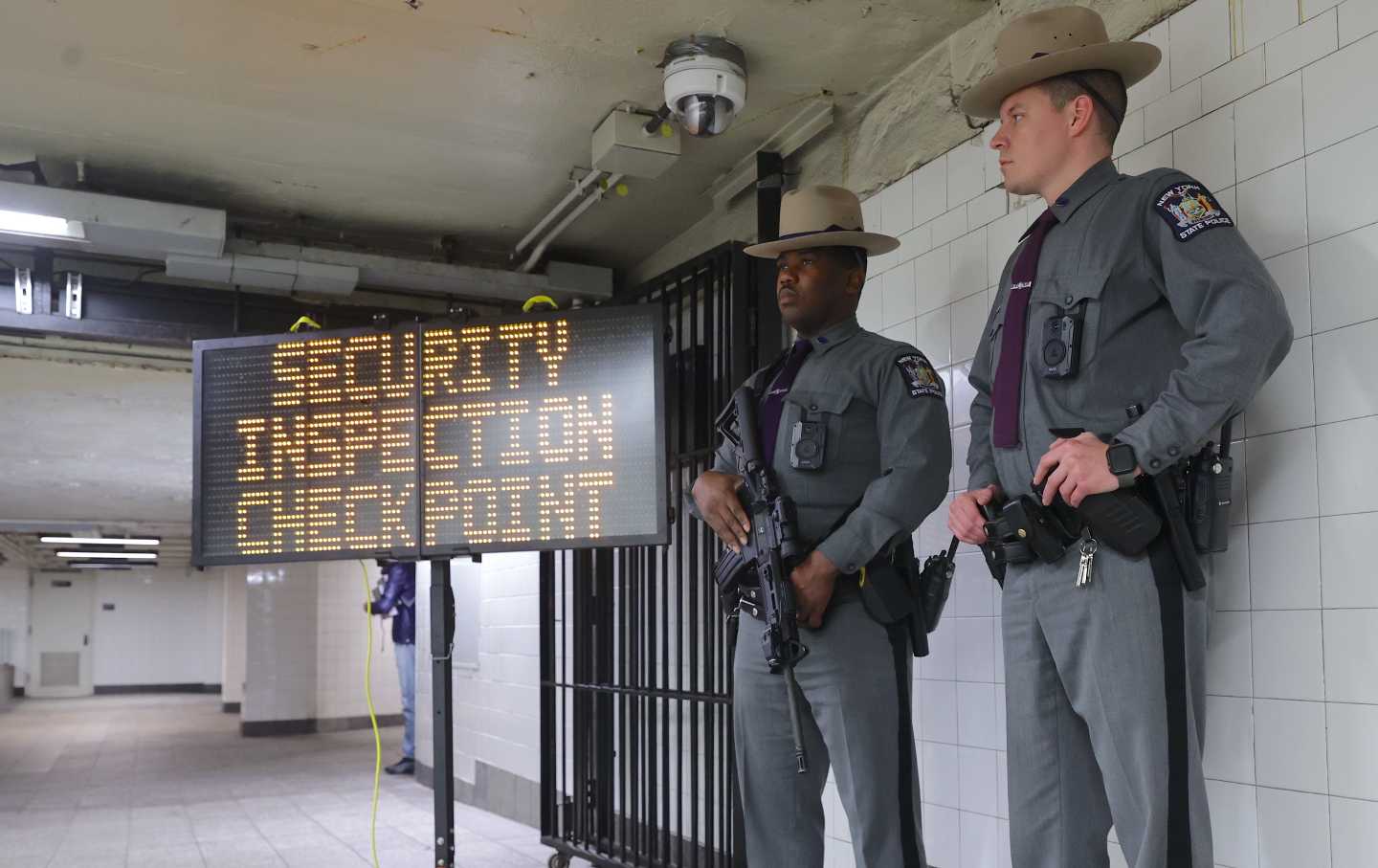
Why Are Armed Troops in NYC Subways? Why Are Armed Troops in NYC Subways?
Kathy Hochul made a grave miscalculation by further militarizing a city she doesn’t live in or understand.
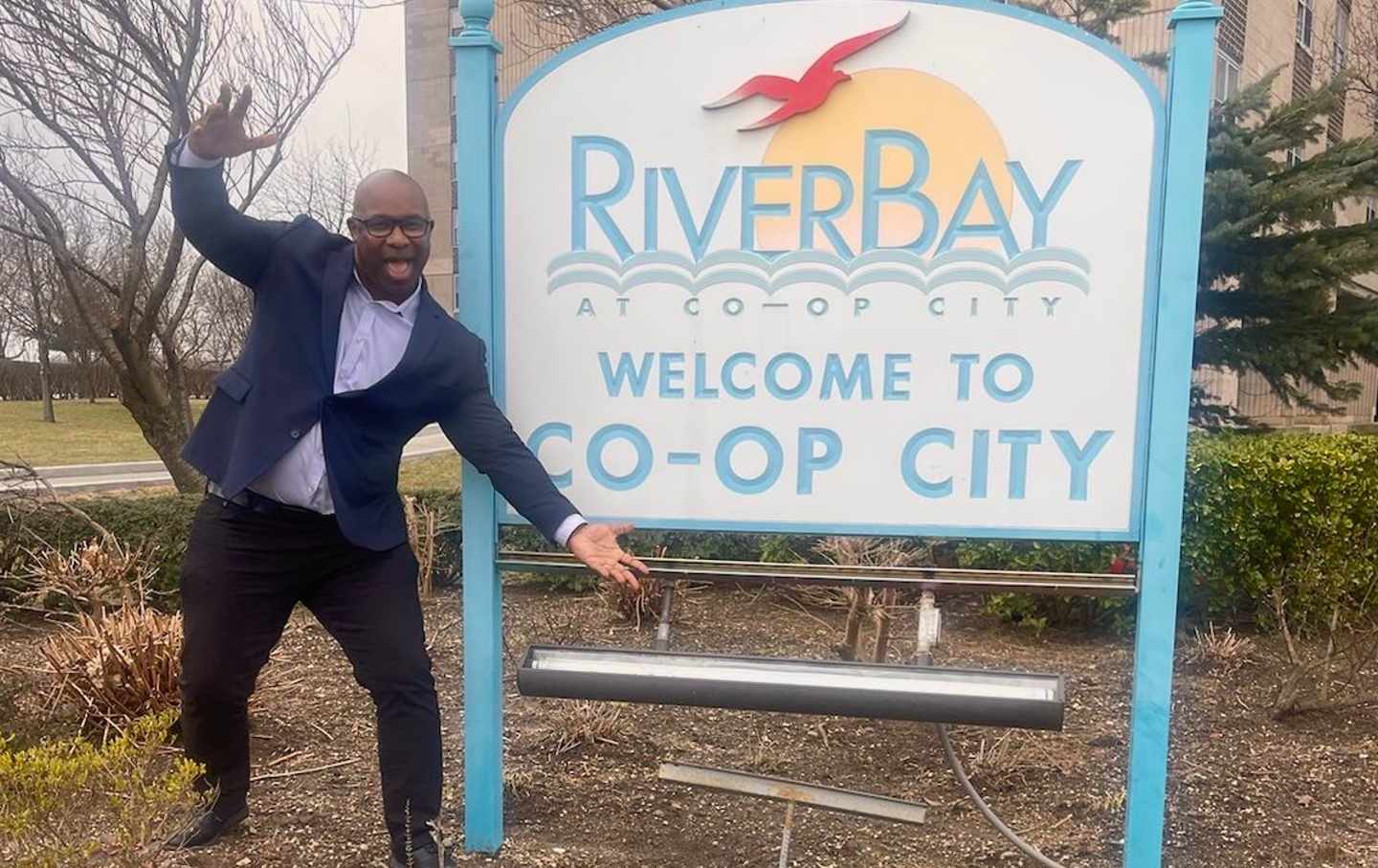
New York's Long Congressional Redistricting Nightmare Finally Comes to an End New York's Long Congressional Redistricting Nightmare Finally Comes to an End
Liberals and leftists hoping for a sure path to retaking the House may be disappointed, but Democrats should still do well. And voters and incumbents each gain valuable clarity.
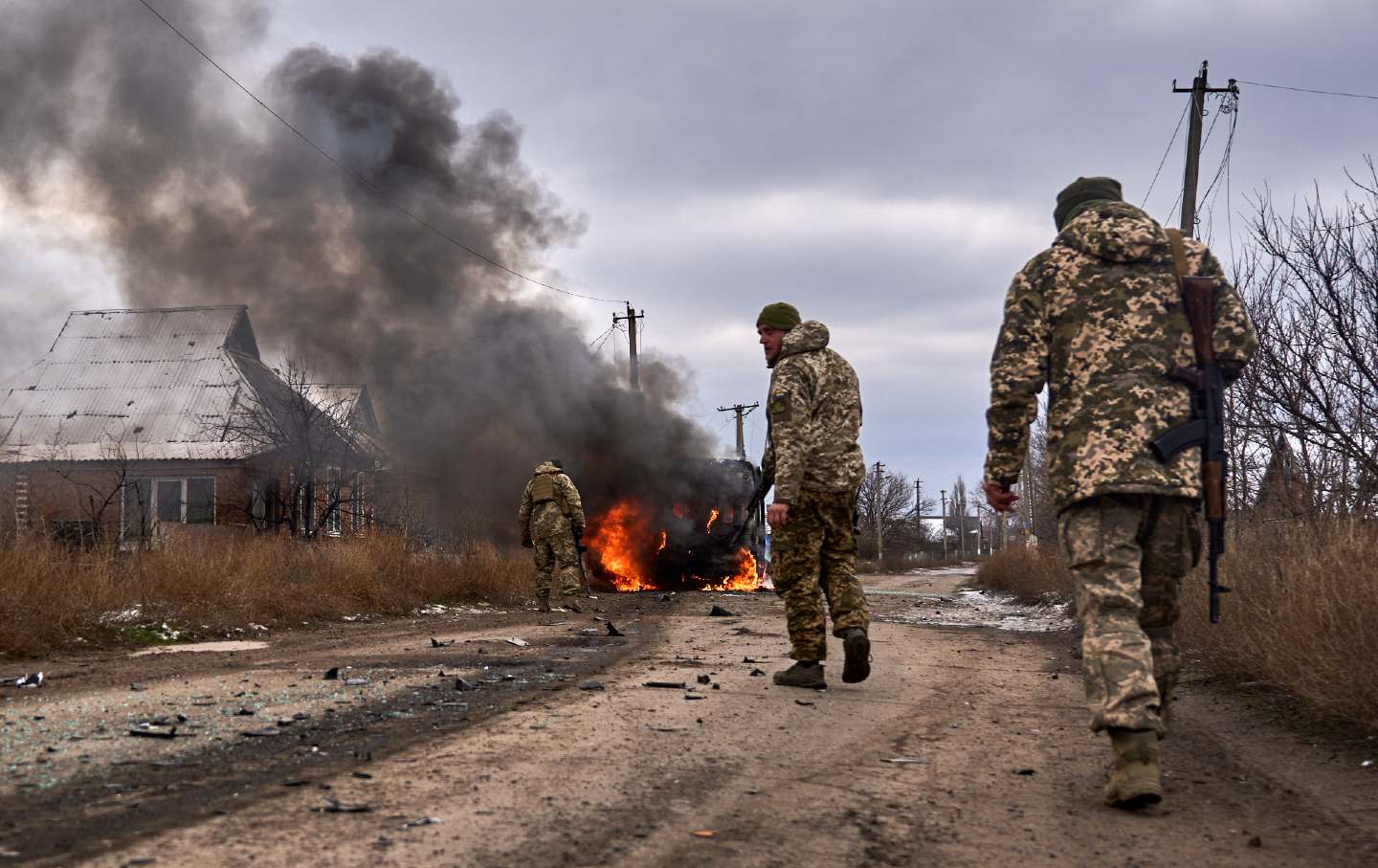
It’s Time to Negotiate With Russia It’s Time to Negotiate With Russia
Diplomacy will be ugly, but peace must be the ultimate goal.

Blink and You Missed It: NYC Mayor Eric Adams Was Accused of Sexual Assault—and Nothing Happened Blink and You Missed It: NYC Mayor Eric Adams Was Accused of Sexual Assault—and Nothing Happened
Why the big yawn by the media over this particular allegation against New York’s scandal-surrounded mayor might actually be a sign of mature judgment.
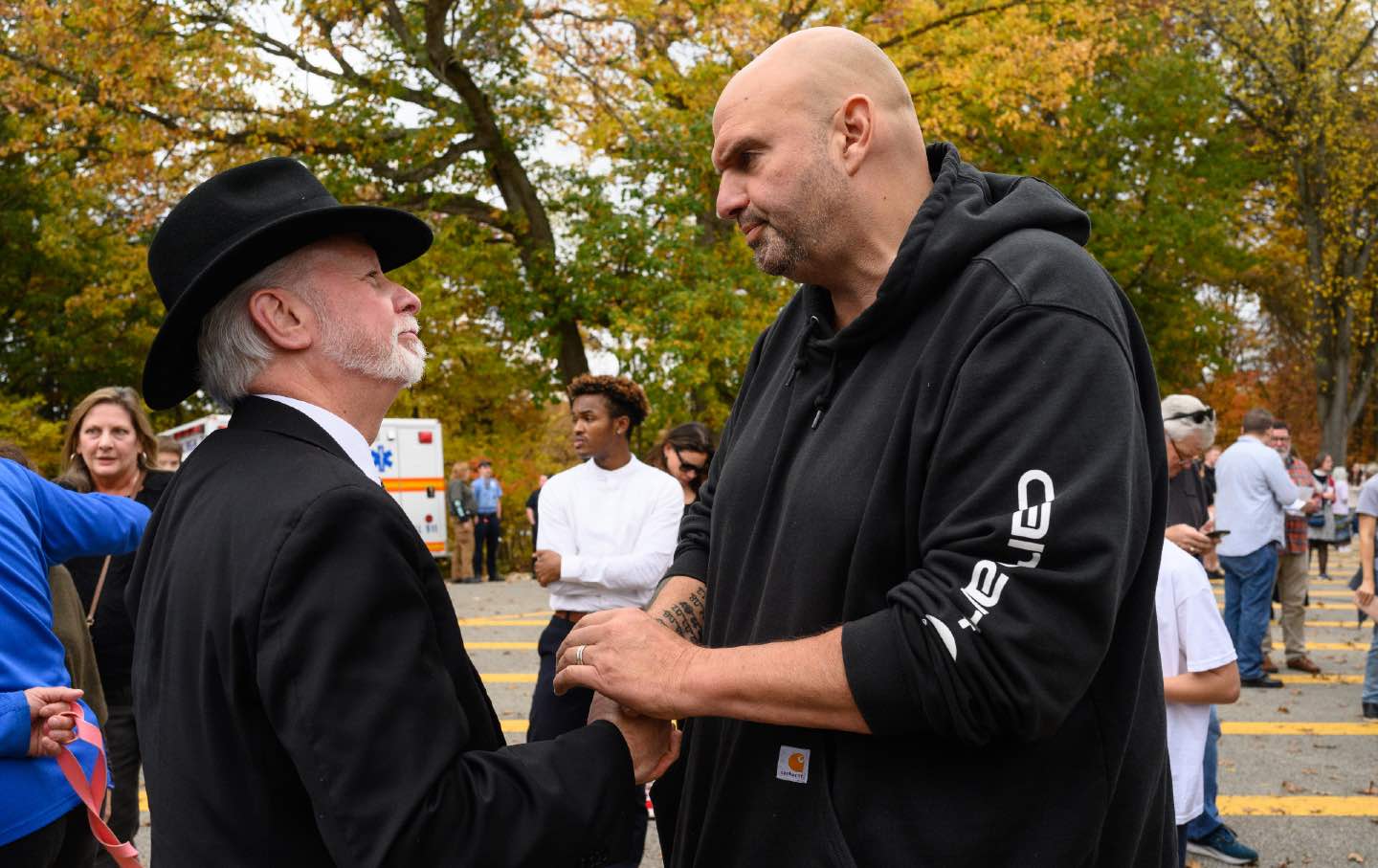
Senator John Fetterman Is a Progressive Icon, a Republican Hate Figure—and a Pro-Israel Pinup Senator John Fetterman Is a Progressive Icon, a Republican Hate Figure—and a Pro-Israel Pinup
The Pennsylvania Democrat has long bucked convention on everything from legalizing marijuana to the Senate dress code. But his views on Israel/Palestine risk alienating his base.

Can New York Make Deadbeat Dolan Stop Freeloading at Madison Square Garden? Can New York Make Deadbeat Dolan Stop Freeloading at Madison Square Garden?
If the city and state can’t prevent the Knicks owner from barring his critics, perhaps they can at least shut down his sweetheart tax subsidy.


